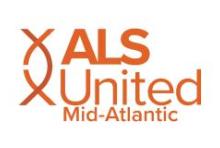Amyotrophic Lateral Sclerosis, (ALS) or better known as Lou Gehrig’s Disease is a fatal neurodegenerative disease that affects the brain and spinal cord causing voluntary muscles to atrophy and die. People with ALS lose the capacity to walk, talk, swallow, and eventually breathe. It is like being a prisoner in your own body, yet most are cognizant of their surroundings. There is no cure or treatment and the average life span after diagnosis is 2-5 years. About 90% of diagnoses are ... Meer lezen
Amyotrophic Lateral Sclerosis, (ALS) or better known as Lou Gehrig’s Disease is a fatal neurodegenerative disease that affects the brain and spinal cord causing voluntary muscles to atrophy and die. People with ALS lose the capacity to walk, talk, swallow, and eventually breathe. It is like being a prisoner in your own body, yet most are cognizant of their surroundings. There is no cure or treatment and the average life span after diagnosis is 2-5 years. About 90% of diagnoses are sporadic, while 5-10% are considered familial, meaning it's genetic. Tragically, veterans are twice as likely to be diagnosed with ALS. Families experience physical, financial, and emotional challenges. The organizations programs are provided at no cost to any family diagnosed with ALS in our service area.
Serving approximately 1,200 families a year who are living with ALS and reside in the eastern half of Pennsylvania, south and central New Jersey and Delaware, The organization offers a multitude of services for people living with ALS (PALS) and their caregivers to help them cope with the challenges of Amyotrophic Lateral Sclerosis. Programs include clinical care in a hospital setting where patients see up to a dozen specialists at one visit. Depending upon the stage of the disease, PALS may be seen by a neurologist, mental health nurse, physical therapist, dietician, assistive technology specialist, occupational therapist, and other specialists necessary to their care. An organization social worker is assigned to every family upon registration who is available at visits and throughout their ALS journey to provide support, offer various resources and answer questions. No service fees are charged. Families have often described their social worker as a lifeline, helping families to stay prepared for the next step of the disease, which greatly helps anxiety levels.
The organizations Durable Medical Equipment and Assistive Technology Programs offer various pieces of equipment and devices to help with ambulation and communication. Medicare and various insurance policies will provide what is needed but often the equipment delivery can be stalled waiting for the approval process. PALS often don’t have the time to wait, and this waiting period can cause unnecessary anxiety and impact quality of life. Additionally, high co-pays and/or deductibles can cause families to do without the necessary equipment. The organizations loan program provides a variety of equipment and devices at no cost that helps fill this insurance gap.
The Accessibility Program installs ramps and stair glides on a cost share basis. In cases where the family cannot afford a partial payment, the organization may cover the entire cost. The organization keeps an inventory of refurbished general ramp pieces that many times help cut down on the cost of the total ramp installation. Van transportation services are also provided to help PALS and their caregivers travel to a clinic visit, doctor's appointment, or a family outing.
As PALS become more dependent, they rely on their loved ones to take care of them. This care turns into an around-the-clock care responsibility and caregivers, who are often spouses and family members, become exhausted and overwhelmed. They need help. The Howard I. Abrams In-Home Care Program provides a solution with grant reimbursements. The subsidy helps families hire caregivers that offer loved ones a brief respite. The grants also allow the family the flexibility to hire caregivers around personal schedules that has been a real plus. In some cases, the extra help has allowed some spouses to continue working and maintain the family’s health insurance. One of the most important results of this program is that it allows PALS to remain in their own home as the disease progresses rather than be placed in a nursing home.
Additionally important are the organizations educational resources, including YouTube videos on care protocols and how to use certain equipment. In the last year, we produced a documentary on
Emergency Preparedness and a brochure on how to help children/grandchildren of PALS cope with an ALS diagnosis. We also provide educational resources on ALS for healthcare providers.
The organization recognizes the importance of giving families a safe, accessible place to gather for enjoyment to escape the challenges of the disease. We provide recreational activities for PALS and their caregivers such as trips to arboretums, amusement parks and special events. Families are provided with 4 free tickets and then a discounted rate is applied for additional guests.
Relying solely on fundraising endeavors to accomplish our goals, revenue is derived from Walks to Defeat ALS, special events, individual donors, state grants and private foundations. Being partners with Benevity will greatly assist the organization in furthering its critical mission of providing services to help people living with ALS live with dignity and independence throughout the disease.
Volledige tekst verbergen